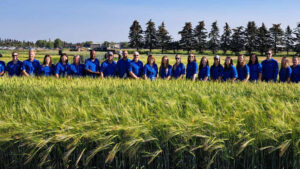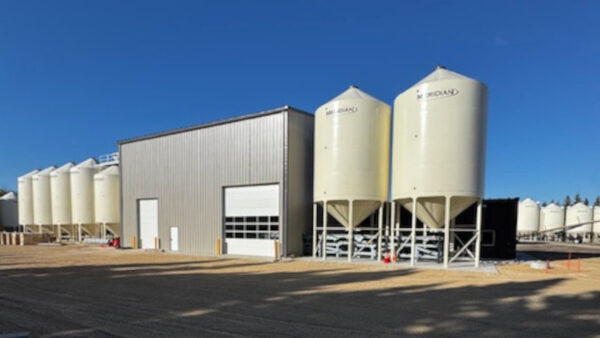New scientific innovations that bring new seed varieties to the market faster will be the topic of an important panel discussion at AgSmart in Olds on July 30.
The panel A Technological Time Machine: How Modern Techniques Will Bring You New Seed Faster will explore the transformative power of technology in the realm of seed development and agricultural innovation.
In this session, experts from both the research side and the world of farming will delve into the fascinating realm of genetic research, the unprecedented speed at which new seed varieties will be brought to market, and how this benefits producers in a myriad of ways. Panelists will be:
- Lori Oatway, Research Scientist — Quality, Western Crop Innovations (WCI)
- Jennifer Zantinge, Research Scientist — Biotechnology, WCI
- Jeremy Boychyn, Director of Research Agronomy & Extension, Alberta Grains
The journey from a summer student at the Field Crop Development Centre in Lacombe (now Western Crop Innovations) to a seasoned research scientist has been nothing short of unique for Oatway, who has revolutionized cereal quality assessment at WCI. The evolution of her career and the impact of her work highlight the incredible potential of technology in advancing agricultural research and breeding programs.
Using technologies like near-infrared spectroscopy (NIRS), Oatway and her team can analyze thousands of samples every year, with results generated in mere seconds. This efficiency was a game-changer for their breeding program. Where traditional methods would require extensive time and resources for analysis, NIRS enabled them to conduct quality assessments between harvest and planting, making selections for breeding advancements at an early stage.
NIRS opened doors to innovation, allowing the team to develop and showcase a range of cereal varieties, each tailored for specific applications.
Zantinge is an authority on how plant breeding has changed drastically over the years; historically, plant breeders relied on visual assessments of plants grown in the field to make selections. However, this approach faced limitations when it came to traits that are not easily discernible through visual inspection.
Zantinge focuses on refining and modernizing the breeding pipeline. The process involves integrating a range of technologies to enhance the accuracy and efficiency of trait selection.
“For instance, some critical traits such as milk quality and disease resistance require advanced techniques like wet chemistry or DNA analysis, as they are not readily observable by simply looking at plants,” she says.
“Over the past two decades, there has been a revolutionary shift in the cost and feasibility of employing molecular markers and DNA analysis in breeding programs. Technological progress has democratized these tools, making them more accessible and cost-effective. Innovative methodologies utilizing fluorescent dyes and specialized equipment have streamlined the analysis process, reducing labor while increasing accuracy.”
Zantinge will highlight, among other things, the integration of digital data collection through drones and remote sensing. These technologies provide breeders with comprehensive insights into plant performance and environmental factors, enabling more informed decisions. The amalgamation of genetic data and field performance metrics allows the creation of algorithms and predictive models to aid in the selection of ideal breeding lines, she adds.
WCI will showcase its research program at AgSmart this year, where it will share a space with the Alberta Seed Guide and the Crop Diagnostic Day.
Boychyn is helping organize the Crop Diagnostic Day, to be held July 31 at the AgSmart event, when Alberta Grains, Alberta Pulse, and Alberta Canola partner with Olds College to bring this co-branded, industry-recognized agricultural diagnostic day under a single banner.
The partnership will showcase the latest agronomic information for producers and agronomists to ensure the newest research being conducted in the Prairies gets to those who need it.
As part of the panel, he will talk about how new technologies are aiding both agronomists and farmers to be more productive and overcome challenges like new disease threats.
The panel takes place July 30 at 11 a.m. in the educational tent. For tickets to AgSmart visit its website.













